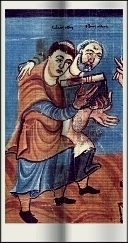

 | Alcuin (right) and Raban Maur (left) |
Originating from a noble Northumbrian family, Alcuin had been born about 735 A.D. in or near York, England. Alcuin himself had changed it Saxon name of origine into the latinized one of 'Albinus' as it was his original name which survived however. He might have been related to Willibrord, missionary to the Frisians and master of St. Boniface. He early entered York's cathedral school and became the pupil of Aelbert, then headmaster of the school, and of St. Colgan. Together with his master, he improved the school's library by journeys to Rome for manuscripts. He pursued this task when he became in turn headmaster of York's school about 767 and York became one of the best library of Europe as the school one of the most important centers of learning. Alcuin may be seen like the continuator of the work led by Bede in Jarrow and although Irish tradition had been brought to Northumbria, Alcuin is better linked to the more strictly Roman, Canterbury tradition. Some think that rhetorics already was absent from the teachings at that time, hence Alcuin had been mostly trained into grammar only
In 781 A.D., probably as he was returning from Rome where he had been to look for the pallium for a Anglo-Saxon bishop, he met Charlemagne in Parma, Italy. He was invited in Aachen where he attended in 782 a meeting of the leading scholars of the time. Afterwards he was appointed headmaster of the Palace School. During two periods, 782-790 and 793-796, he became at the same time teacher at the School, a minister of education of sort for the Frankish kingdom, and, through the development of the easier-to-use Caroline minuscule script, the preserver of ancient works and knowledge for next generations. Alcuin's enthousiasm for learning, teaching, and library work made him the natural master of the next generation of European teachers and scholars
In 796 Alcuin retired from the Palace School and became abbot of St. Martin of Tours. He pursued there his work and he had brought to thiat abbey some rare works from York. As Alcuin told himself, he sowed in Britain, he later sowed in France so to bring some the Holy Scriptures and others the ancient learning. Alcuin died in 804 A.D. after having been a liturgist and theologian too, having brought to the Frankish Church a taste of Rome
Website Manager: G. Guichard, site Learning and Knowledge In the Carolingian Times / Erudition et savoir à l'époque carolingienne, http://schoolsempir.6te.net. Page Editor: G. Guichard. last edited: 12/28/2010. contact us at geguicha@outlook.com